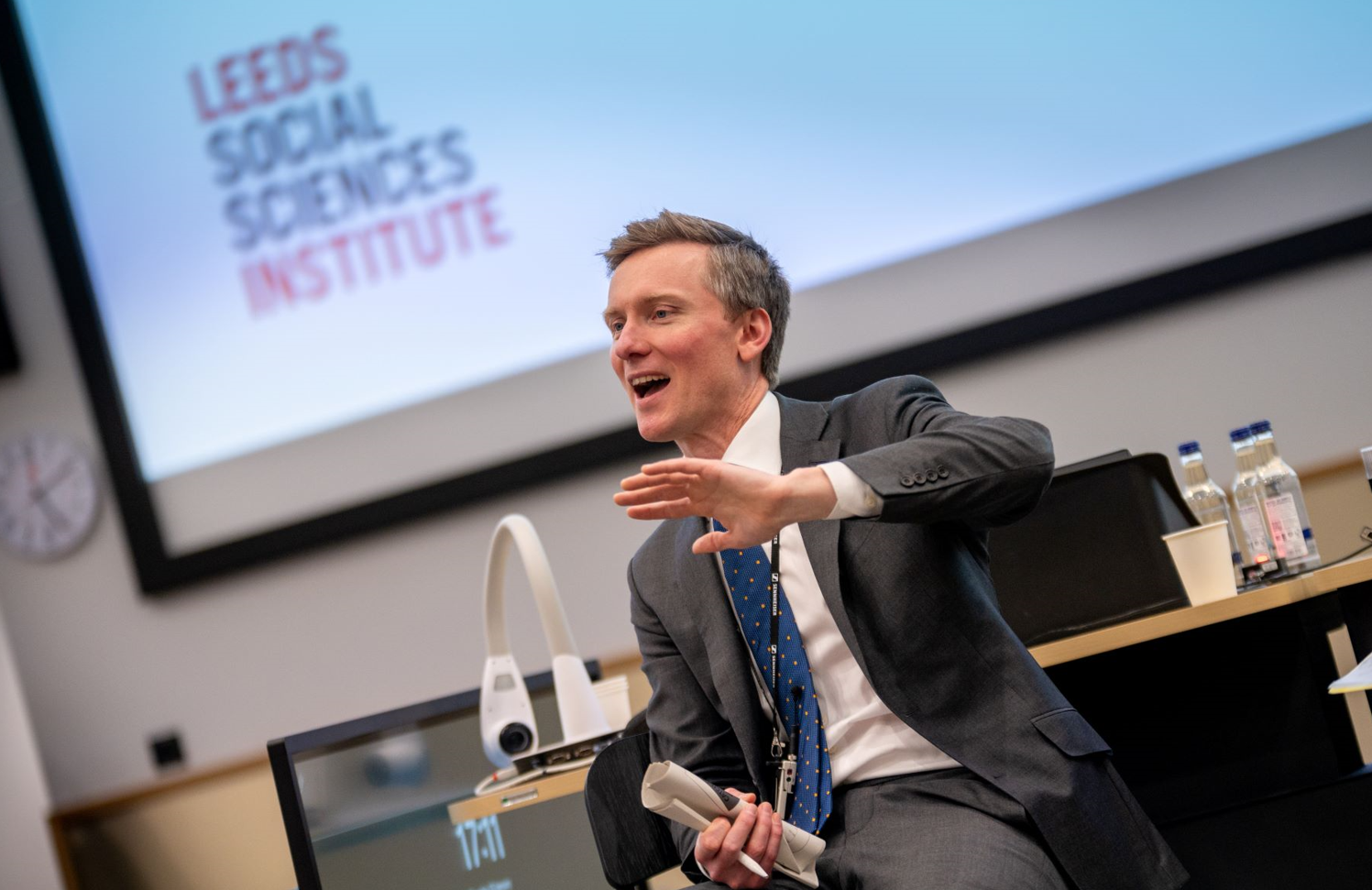Blog Post - Torsten Bell event - Mission (Im)possible: How to Reclaim Britain’s Future?

Leeds Social Sciences Institute (LSSI) was delighted to welcome Torsten Bell MP for a wide-ranging talk on Britain’s economy and how we build a fairer and more prosperous society
Blog post prepared by Tim Joubert, Leeds Social Sciences Institute Research Assistant
Introduced by the University of Leeds’ Vice-Chancellor, Professor Shearer West, this flagship event was an opportunity to reflect on current issues and challenges in social and economic policy, as part of LSSI’s mission to address critical societal issues and drive policy impacts through interdisciplinary research. Bell’s talk showcased the value of bringing together academic research and policymaking, as it offered a thought-provoking mix of pragmatic policy direction underpinned by evidence and critical analysis. Drawing on his book, Bell presented several big-picture insights:
- Britain is not going ‘great’. Everyone appears to agree on this regardless of age, income, and party affiliation, and a quick straw poll of the audience confirmed it. This reflects a real economic situation, and Bell marshals plenty of evidence to show that Britain is indeed doing poorly. Why? A ‘toxic combination’ of long-term high inequality and more recent stagnation and low productivity have pulled the country into decline and drastically held back the country’s standards of living, especially for the poorest and middle-income households.
- The problems we face as a nation are economic, not cultural. Looking beyond fabricated culture wars, most real-world measures show Britain is relatively cohesive and integrated. Reactionaries have lost nearly every argument about society and culture, but not on the economy. The gloomy economic outlook of the country, however, is something that populism has been able to thrive on. We think things can’t or won’t get better because we haven’t seen things get better for a very long time. This lack of economic hope leads to zero-sum thinking that pits people against each other and feeds our social and cultural divisions.
- The depth of Britain’s economic malaise is evident across society. With low growth, wages have flatlined while job satisfaction has tanked; with low investment, our aging infrastructure is struggling to cope; with little housing growth we spend too much of our incomes on inadequate and tiny spaces to live; with long-term welfare cuts the poorest have been left behind; and with all of these in combination, public services are strained and struggling to deliver.
- We need to focus on the big issues and do the basics properly again. Britain can improve on most of these measures by doing basic stuff right, and politics should focus on actual delivery of important material things: helping people access good jobs and good homes and investing in infrastructure and a properly functioning welfare state. This requires strong political leadership, and politicians who can take decisions and be accountable for them.
- There are reasons for optimism. Policy can and does make a difference, and everyone now recognises the need for change. Britain’s economy has potential – we make and do important, useful and innovative things, not least in our universities – and there is no necessary trade-off between being a more prosperous or a more equal country. We can aim for both, and the scale of Britain’s decline means just catching up and becoming more ‘normal’ when compared to similar countries, would massively improve our standard of living. This in itself is a reason to believe in the possibility of (and work toward) change: our present condition is not the global norm.
While stressing this note of optimism, Bell also reflected on some of the psychology of politics and cautioned against certain unhelpful ways of thinking – particularly the emptier optimisms of denialism (everything is actually going great) and boosterism (things are going to go great because we say so). But other ways of thinking also hold us back from getting stuck in to sensibly improving things in the present, and Bell points fingers at utopianism (things are so bad we have to do something really radical) and fatalism (if we can’t do the big thing we may as well not bother) for ignoring political and economic realities. What he suggests instead is a more hard-headed optimism that offers hope for the future direction of the country based in a practical understanding of what the country is like. Bell presents this as a new form of patriotism that should instil hope for improvement, concentrate on what Britain does well, start doing things that improve people’s lives, and in doing so stop the country from getting into a ‘doom loop’.
At LSSI we hope to continue conversations in this vein and use our interdisciplinary strengths and collaborations with other University of Leeds entities such as Policy Leeds, YPIP and Y-PERN to enrich partnerships between academic researchers, civic organisations and policymakers. In these ways we will deepen our understanding of global challenges while delivering practical local and national public policy impacts.
